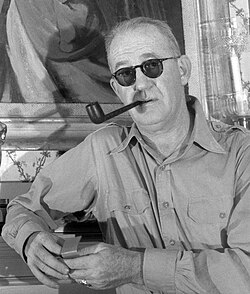| 13th Academy Awards | |
|---|---|
 | |
| Date | February 27, 1941 |
| Site | Biltmore Bowl, Biltmore Hotel Los Angeles, California |
| Hosted by | Bob Hope |
| Highlights | |
| Best Picture | Rebecca |
| Most awards | The Thief of Bagdad (3) |
| Most nominations | Rebecca (11) |
The 13th Academy Awards were held on February 27, 1941, to honor films released in 1940. This was the first year that sealed envelopes were used to keep the names of the winners secret. [1] The accounting firm of Price Waterhouse was hired to count the ballots, after voting results in 1939 were leaked by the Los Angeles Times . [2] The gathering was addressed over the radio by President Franklin D. Roosevelt. [2]
Contents
- Winners and nominees
- Awards
- Special Awards
- Ceremony information
- Multiple nominations and awards
- See also
- References
Walter Brennan's victory for his performance in The Westerner made him the first actor to win an Academy Award more than twice. [2]
Best Original Screenplay was introduced at this ceremony, alongside Best Screenplay, which would eventually become Best Adapted Screenplay, and Best Original Story.
Independent producer David O. Selznick, who had produced the previous year's Best Picture winner Gone with the Wind (1939), produced the film with the most nominations again this year, Rebecca (11), and campaigned heavily for its win. [3] The film won Best Picture, making Selznick the first to produce two consecutive winners; its only other win was for Best Cinematography (Black and White), marking the last time to date a film would win Best Picture but not win for either directing, acting, or writing.
The film's distributor, United Artists, was the last of the original film studios (Metro-Goldwyn-Mayer, Columbia, 20th Century-Fox, Warner Bros., RKO Radio, Universal, and Paramount) to win Best Picture. Rebecca was the first American film directed by Alfred Hitchcock, and the only one of his films to win Best Picture. Hitchcock had two films nominated for Best Picture, the other being Foreign Correspondent , and two other directors also had two films in the running: Sam Wood ( Our Town and Kitty Foyle ) and John Ford ( The Long Voyage Home and The Grapes of Wrath , which won Best Director).
Pinocchio was the first animated feature film to win competitive Oscars, for Best Original Score and Best Original Song, starting a long tradition of animated films winning in these categories. The Thief of Bagdad received the most Oscars of the evening (3), the first time a film not nominated for Best Picture won the most awards. This and Pinocchio were the first films not nominated for Best Picture to receive multiple awards in Oscar history.








